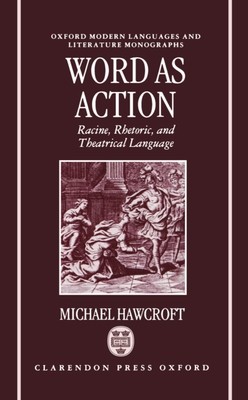
- We will send in 10–14 business days.
- Author: Michael Hawcroft
- Publisher: Clarendon Press
- ISBN-10: 0198151853
- ISBN-13: 9780198151852
- Format: 15.8 x 21.1 x 2.3 cm, hardcover
- Language: English
- SAVE -10% with code: EXTRA
Reviews
Description
Hawcroft presents an exploration of the theatrical qualities of the language of France's greatest tragedian, Jean Racine, taking as its analytical tool two neglected parts of rhetoric--inventio and dispositio. Racine's dialogue is exciting, Hawcroft argues, because he makes persuasive interaction of characters a key feature of his dramatic technique. This book shows how Racine deploys persuasion in well-defined contexts: trials, embassies, and councils; informal oratory as protagonists try to manipulate each other and their confidants in order to make their own views and wishes prevail; self-persuasion in monologues; and narrations, often used by characters with persuasive intent. The book draws illuminating and provocative comparisons with other playwrights and offers a closer and better documented description of the specific nature of Racine's theatrical language than has previously been available in any one study.
EXTRA 10 % discount with code: EXTRA
The promotion ends in 19d.13:00:17
The discount code is valid when purchasing from 10 €. Discounts do not stack.
- Author: Michael Hawcroft
- Publisher: Clarendon Press
- ISBN-10: 0198151853
- ISBN-13: 9780198151852
- Format: 15.8 x 21.1 x 2.3 cm, hardcover
- Language: English English
Hawcroft presents an exploration of the theatrical qualities of the language of France's greatest tragedian, Jean Racine, taking as its analytical tool two neglected parts of rhetoric--inventio and dispositio. Racine's dialogue is exciting, Hawcroft argues, because he makes persuasive interaction of characters a key feature of his dramatic technique. This book shows how Racine deploys persuasion in well-defined contexts: trials, embassies, and councils; informal oratory as protagonists try to manipulate each other and their confidants in order to make their own views and wishes prevail; self-persuasion in monologues; and narrations, often used by characters with persuasive intent. The book draws illuminating and provocative comparisons with other playwrights and offers a closer and better documented description of the specific nature of Racine's theatrical language than has previously been available in any one study.


Reviews